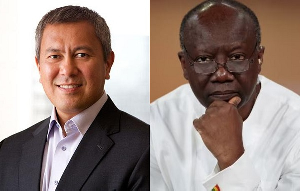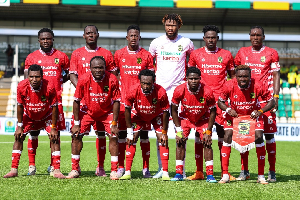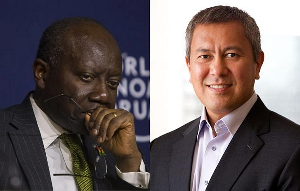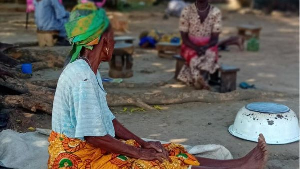Between the 9th-15th of November 2018, my organization, Marie Stopes Ghana supported me to participate in the 5th International Conference on Family Planning (ICFP) in Rwanda. The Ghanaian presence at the Conference was very conspicuous: I saw many Academics from Ghana, Heads of NGOs and Civil Society Organisations, Heads of Government Institutions, Parliamentarians, Ghanaian Religious Leaders, Ghanaian Youth, among many others.
I saw many Family Planning Posters by Ghanaians; I also saw many Ghanaians make beautiful presentations of their work in Ghana to the international community. I felt proud within the walls of the Kigali Convention Centre (KCC) as a Ghanaian up to a point, but began asking very hard questions to myself when I began hearing the extent of progress other developing countries represented at the Conference, including the host country, Rwanda had made in the area of Sexual and Reproductive Health (SRH), and more specifically Family Planning (FP).
I became very disturbed as I commuted between the hotel and the KCC and saw for myself the progress Kigali had made as an African city, and thought I should share my lessons. So I start with the testimony of Kigali!
KIGALI
My trip to the ICFP was my first visit to Rwanda, a country which experienced a bitter genocide which occurred between April – July 1994, and saw the gruesome murder of about 1,000,000 people. In my imaginations, I was visiting a country which was still recovering from years of civil war. What I saw in Kigali on arrival, however, left me ashamed of many things in Accra as a capital city. Although I was there for a week, I do not remember seeing any choked gutter. I did not also see any litter on the floor in the principal streets and localities of the city: everywhere was clean. The gutter which run in front of my hotel, the Ubumwe Grande Hotel was uncovered, yet had not a single litter in it.
I saw only one beggar my whole time there, and even her, a middle aged woman with her infant daughter was ashamed of what she was doing. I did not see the youth in the streets and under the traffic lights hawking. I suppose it was because I didn’t go to the ‘downtown’ of Kigali. I saw a very efficient bus system which was highly patronized in a very ordered manner. Nobody would rush to enter the bus; they would all walk respectfully from the bus stop and climb up the stair of the bus and take their seats or stand inside it. Every ‘Okada’ I saw had two helmets- one for the motorist and another for the passenger who sat behind.
I found Kigali to be very green; so very well vegetated with lots of canopies, grasses and protected walkways through parks. I did not see one motorist cross the red light at the many traffic stops. Impressively, there was at every traffic intersection, a police man with gun 24hours of the day, monitoring traffic and maintaining security on the streets throughout the day. I was also informed of the uncountable security men in mufti deployed all around the city to help maintain law and order. I was told by my Taxi Driver friends that armed robbery was not common in the city. I didn’t hear one driver blow the horn on the road; everything seemed to be so much in order on the road. The security arrangements at the airport were especially impressive! Almost all of the other nationals, including other Ghanaians I met at the airport on my return were blown away by the level of security at the airport.
Whilst on an RwandAir flight back to my beloved Ghana, I thought hard and asked myself many questions, I should have known answers to, but realized I didn’t, especially as I juxtaposed Ghana’s strengths and opportunities with that of Rwanda. Here are two very different countries: One is landlocked, the other is blessed with the ocean and uncountable rivers and lakes. One has suffered years of civil war and ethnic cleansing; the other has seen none of that. One has no spectacular natural resources, apart from its wildlife; the other has almost everything called valuable natural resources – gold, forest cover, bauxite, manganese, diamond, crude oil, wildlife etc.
One has only recently trained its citizens to compete in the global market with the English Language; the other has been a fluent English speaker for over a century. One has a human resource base of a little over 11million; the other has nearly 30million strong and healthy population. On paper, it should be easy to conclude that the more endowed country would be far advanced in terms of development, yet I do not think that is the case.
Immediately I exited the Kotoka International Airport and hit the 37-Legon highway, I was met with everything. Just at the airport traffic light, I counted more than 15 beggars all seeking support.
Then the incessant bleating of horns from the trotros, taxi cabs and even private vehicles; then the motorists without helmets who do not stop at the red light; then the traffic blocks at the traffic lights; then the unarmed Police men whose instructions are easily flouted by impudent motorists; then the unbearable filth in the gutters, on the roads and by the roads; then the screams and shouts everywhere on the road. Ladies and Gentlemen, I felt sad for our beloved country; it was as though we were a people who could not conform to even the most fundamental principles of social order. What a people we are!
ICFP
Back to my ICFP story. As was my first ICFP, I made it a point to listen keenly and take copious notes of key concepts and good practices I could learn from and replicate in our Ghana Country Programme to support our Family Planning interventions in the private and public sectors.
a) Family Planning as a Development Goal
My first observation was the fact that, as a country we had not positioned a fundamental need and right like FP in the appropriate context. Because of that we have for years not given FP the recognition and support it needs. Here in Ghana, we have positioned FP as a health issue, and that is where I think the problem is. But you see, FP goes way beyond health; it is a fundamental developmental issue. In the opening preamble of our 1994 National Population Policy, the country’s population is described as the instrument and objective of development. The Policy identifies population management, especially through fertility management as a major strategy to improving the quality of our human capital. FP is positioned as a fundamental development need in the policy, but the practice thereof has been very different. From our leadership as a country to the ordinary citizen in my hometown, FP is seen as a women’s issue; it is one of those services a woman receives when she goes to the health facility; it is a medicalized service, and in many ways an over-medicalised one, and that to me is where the problem is. So what is the way forward? We need to situate FP as a development goal.
I am yet to come across a single evidence of a country which has developed over the past 70years which did not prioritize fertility management through family planning as part of its development goals. The reason for development is the people; they are also the instruments for development. At any point in time, you must have a strategy to ensure that the numbers you have are by choice, not chance. You should be able to determine how many people you want and can adequately provide for. This decision is taken in leadership, and heavily promoted in the home, where all the beautiful policies receive interpretation in the bedroom. The first point of consideration in development planning should therefore be the people; the number of people we are planning for. It is following this determination that we can begin to make plans for quality health, education, jobs, infrastructure and security for these same people. As a regular conference convener, the first question my team and I have always asked at the start of every project has been ‘how many people are we expecting?’. That informs all other decisions – the budget, the venue, feeding, sanitation, security etc. Meanwhile, it seems that is the last question we always ask as a people. We are so eager to implement social policies such as free education and healthcare without pausing to ask how many people can be supported by such interventions in the most sustainable manner over the long term. This is our bane; the most important question has become the least considered in our development discourse.
Quite recently, the Executive Director of the National Population Council, Dr. Leticia Adelaide Appiah granted an interview on the overpopulation crises of Nigeria and made some very staggering revelations I think are worth re-iterating here as lessons for Ghana. Dr. Appiah shared that by 1960, Nigeria had a population of 45.1million whilst the United Kingdom had a population of 52.2million. By 2017, however, Nigeria’s population had increased to 191million, whilst that of the UK, was 66.2million. Thus although the UK was more populated than Nigeria at her independence from the UK, Nigeria today has three times the population of the UK.
The impact of population growth on the two countries are clear for all to see. Whereas the UK is well able to provide all the essential social services and welfare packages for its citizens, and also takes care of millions of immigrants, Nigeria is struggling to supply the most basic social services for its people. Dr. Appiah shared further that some economists have posited that, at one percent population growth rate, there must be a corresponding 6.5 -7% growth in GDP in order to maintain the same quality of life for the citizenry. At our current 2.2-2.5% annual population growth rate, we can all estimate the level of annual GDP growth rate we need to even maintain the current quality of life for our people. Meanwhile, FP can easily help us avoid this undue stress on ourselves and our development agenda as a people, by helping to prevent unintended pregnancies, and ensuring that every birth is wanted. It is open secret that nearly 45 per cent of all pregnancies in a given year here in Ghana are unintended: the women did not want the children. If FP is not such an important development issue, then I do not know what else is.
b) Ghana is Lagging Behind in Family Planning
My second observation from the ICFP was the fact that Ghana is seriously lagging behind in improving the use of Modern Contraception. Our rate of utilization of FP services is low. With our current modern Contraceptive Prevalence Rate (mCPR) at 25% as reported in our 2017 Maternal Health Survey, Ghana has only improved by 3% since 2014. We therefore improve by one percent (1%) every year from 2014 when we reported 22% mCPR. Mathematically then, we will need another 25years to reach mCPR of 50%. But can we wait for that long? I think the answer is a big no! We need to quadruple efforts at promoting voluntary contraception among our sexually active adolescents and young people, and government must show stronger commitment to FP than we are seeing now. At the Conference, I got to know that in 13years, Rwanda had improved its mCPR from 10% in 2005 to 50% in 2018. By 2024, they aim to be at 60% mCPR. They have grown in their FP usage by 3% every year. Then came the story of Burkina Faso: by 2014, Burkina’s mCPR was 20%, two percentage points behind Ghana. Only three years afterwards, Burkina has chalked a 30% mCPR, growing at 3% per annum, whilst Ghana grows at 1% per annum. As I listened to the Prime Minister of Rwanda, and the Minister of Health of Burkina Faso on what had accounted for their quantum leaps into success, I understood why Ghana had been such a slow player. Both Governments have committed to investing heavily in health, especially FP and have also positioned FP as a major development goal.
They really want to bring down fertility rates amongst their women, and ensure that they have family sizes they can adequately cater for, whilst also protecting the lives of their women. The story is, however, not so for Ghana. We have not and are not investing enough in this important service. Ghana is economically more endowed than these two countries we are talking about here, yet they have found it needful to commit very significant proportions of their resources to improving the health of their people, by among others, increasing their access to choice as far as their reproductive health is concerned. But for us, the least said, the better. A bigger chunk of budget for FP commodities is still funded by donors such as UNFPA and USAID. Our FP programmes are almost totally donor funded.
c) Ghana is Behind in Investment in Health and Family Planning
My third observation was also the fact that, Ghana is very much behind in terms of investment in health. I have observed with much sadness the ever decreasing budgetary allocation by successive governments to health since the Abuja Declaration of 2001, at which Ghana committed to allocating at least 15% of its annual budget to health. Today, Rwanda commits 20% of its annual budget to health. A significant part of these resources go into the provision of sexual and reproductive health services including FP and HIV and AIDS. Burkina Faso has also been increasing its budgetary allocation to health every year since the incumbent government took office, and is very close to achieving the minimum 15% Abuja threshold.
Again a significant proportion of these resources go into sexual and reproductive health. In both countries, there is a very strong Presidential support for FP: both Presidents are key advocates for FP services. Clearly, there is an opportunity for Ghana to learn from these examples of top level support for an essential service such as FP. Since 2006, Ghana’s investment in health, as a proportion of annual national budget has been declining. I thought I should insert this simple table to help us appreciate how low we have sunk as a nation.
Percentage of annual national budget allocated to health
2006 2007 2008 2009 2010 2011 2012 2013 2014 2015 2016 2017 2018
16.24% 14.57% 14.87% 14.27% 11.04% 12.46% 13.3% 11.08% 9.26% 6.97% 7.78% 7.77% 7.23%
We are currently not meeting even half the Abuja commitment, and that is a huge challenge for us as a people. This has always been my argument as one trained in Practising Sustainable Development. True development starts with the people; it starts with the health of the people, because it is only when the people are healthy that they can be educated and also take advantage of economic opportunities. And so in that order, human capital development starts with investments in firstly the health of the people, and then education, and then job creation, and then infrastructure, and then security and all the other issues. Within the health domain, child health and sexual and reproductive health must receive the greatest attention. Those two are among the cornerstones of a robust health system. But you see, we cannot say this for our Ghanaian situation. We do not invest in Public Health; we invest millions to build curative health centres such as hospitals and depend on a donor to fund our preventive health interventions. This is a great paradox to me.
I thought we would rather invest to prevent the sickness, than to invest to cure it, because prevention is better than cure? The Table above is reflective of budgetary allocations to the health sector in general, a large proportion of which goes into remuneration and not capital investment and services. When I tried gathering data for investments in family planning and sexual and reproductive health in general, the findings were too depressing to share. If we really want to improve the use of modern contraception, then it is vital that government increases investment into the sector. The sexual and reproductive health needs of our adolescents and young people must be paramount in our public health intervention programming and investments.
I would not formally conclude my article because it is the first of a series
I aim to share with our leadership as a country and our people. In my next episode of Testimonies from Kigali, Lessons for Ghana, I will tell you about how we have been playing with the future of our adolescent girls with our lip services on teenage pregnancies. I am an optimist, and believe in our ability to rise up as a people and solve our problems; that is the Ghanaian spirit I was introduced to as a child. We can do it if we decide to; it is just about re-aligning our priorities, and putting the right people in charge of our public health interventions at all levels.
Opinions of Thursday, 13 December 2018
Columnist: Godfred Bonnah Nkansah















